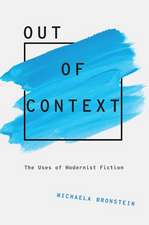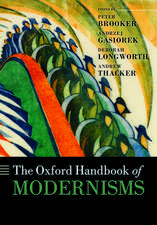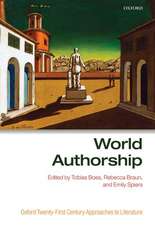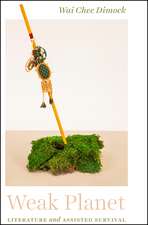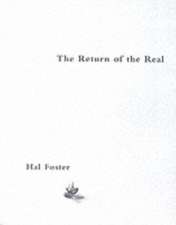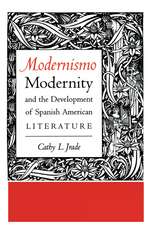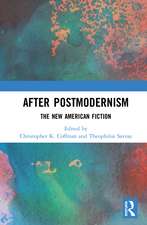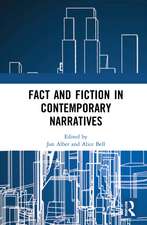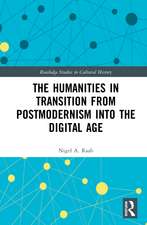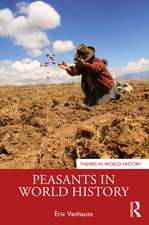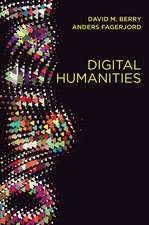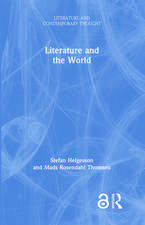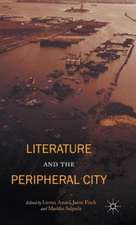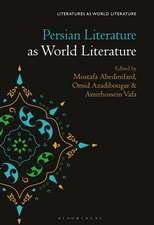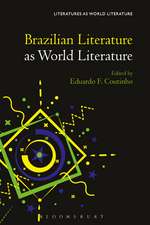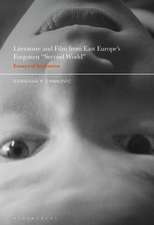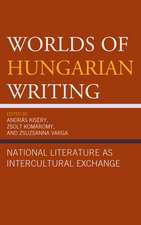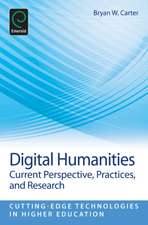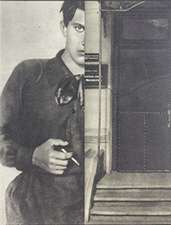The Bloomsbury Handbook of Posthumanism: Bloomsbury Handbooks
Editat de Dr Mads Rosendahl Thomsen, Professor Jacob Wambergen Limba Engleză Hardback – 19 aug 2020
| Toate formatele și edițiile | Preț | Express |
|---|---|---|
| Paperback (1) | 141.20 lei 3-5 săpt. | |
| Bloomsbury Publishing – 20 apr 2022 | 141.20 lei 3-5 săpt. | |
| Hardback (1) | 777.86 lei 6-8 săpt. | |
| Bloomsbury Publishing – 19 aug 2020 | 777.86 lei 6-8 săpt. |
Din seria Bloomsbury Handbooks
- 41%
 Preț: 208.30 lei
Preț: 208.30 lei - 43%
 Preț: 640.21 lei
Preț: 640.21 lei - 44%
 Preț: 673.52 lei
Preț: 673.52 lei - 45%
 Preț: 141.20 lei
Preț: 141.20 lei - 43%
 Preț: 637.37 lei
Preț: 637.37 lei - 39%
 Preț: 696.17 lei
Preț: 696.17 lei - 41%
 Preț: 208.38 lei
Preț: 208.38 lei - 43%
 Preț: 679.49 lei
Preț: 679.49 lei - 43%
 Preț: 635.92 lei
Preț: 635.92 lei - 44%
 Preț: 626.47 lei
Preț: 626.47 lei - 41%
 Preț: 208.18 lei
Preț: 208.18 lei - 43%
 Preț: 197.67 lei
Preț: 197.67 lei - 41%
 Preț: 207.06 lei
Preț: 207.06 lei -
 Preț: 129.81 lei
Preț: 129.81 lei - 39%
 Preț: 680.07 lei
Preț: 680.07 lei - 44%
 Preț: 673.52 lei
Preț: 673.52 lei - 43%
 Preț: 638.78 lei
Preț: 638.78 lei - 39%
 Preț: 682.82 lei
Preț: 682.82 lei - 21%
 Preț: 278.65 lei
Preț: 278.65 lei - 43%
 Preț: 634.04 lei
Preț: 634.04 lei - 43%
 Preț: 631.68 lei
Preț: 631.68 lei - 43%
 Preț: 632.61 lei
Preț: 632.61 lei - 44%
 Preț: 626.47 lei
Preț: 626.47 lei - 43%
 Preț: 637.84 lei
Preț: 637.84 lei - 45%
 Preț: 137.40 lei
Preț: 137.40 lei - 44%
 Preț: 141.67 lei
Preț: 141.67 lei - 43%
 Preț: 824.17 lei
Preț: 824.17 lei - 12%
 Preț: 198.96 lei
Preț: 198.96 lei - 43%
 Preț: 633.96 lei
Preț: 633.96 lei - 43%
 Preț: 731.21 lei
Preț: 731.21 lei - 43%
 Preț: 640.88 lei
Preț: 640.88 lei - 43%
 Preț: 679.85 lei
Preț: 679.85 lei - 43%
 Preț: 632.80 lei
Preț: 632.80 lei - 10%
 Preț: 218.15 lei
Preț: 218.15 lei - 43%
 Preț: 685.76 lei
Preț: 685.76 lei - 43%
 Preț: 688.12 lei
Preț: 688.12 lei - 43%
 Preț: 631.97 lei
Preț: 631.97 lei - 44%
 Preț: 626.47 lei
Preț: 626.47 lei - 21%
 Preț: 897.24 lei
Preț: 897.24 lei - 12%
 Preț: 201.62 lei
Preț: 201.62 lei - 44%
 Preț: 721.05 lei
Preț: 721.05 lei - 43%
 Preț: 683.36 lei
Preț: 683.36 lei -
 Preț: 821.51 lei
Preț: 821.51 lei - 44%
 Preț: 626.47 lei
Preț: 626.47 lei - 44%
 Preț: 814.68 lei
Preț: 814.68 lei - 21%
 Preț: 228.89 lei
Preț: 228.89 lei - 43%
 Preț: 686.61 lei
Preț: 686.61 lei
Preț: 777.86 lei
Preț vechi: 1371.73 lei
-43% Nou
Puncte Express: 1167
Preț estimativ în valută:
148.89€ • 161.78$ • 125.15£
148.89€ • 161.78$ • 125.15£
Carte tipărită la comandă
Livrare economică 21 aprilie-05 mai
Preluare comenzi: 021 569.72.76
Specificații
ISBN-13: 9781350090477
ISBN-10: 1350090476
Pagini: 472
Ilustrații: 9 bw illus
Dimensiuni: 169 x 244 mm
Greutate: 0.94 kg
Editura: Bloomsbury Publishing
Colecția Bloomsbury Academic
Seria Bloomsbury Handbooks
Locul publicării:London, United Kingdom
ISBN-10: 1350090476
Pagini: 472
Ilustrații: 9 bw illus
Dimensiuni: 169 x 244 mm
Greutate: 0.94 kg
Editura: Bloomsbury Publishing
Colecția Bloomsbury Academic
Seria Bloomsbury Handbooks
Locul publicării:London, United Kingdom
Caracteristici
Covers a wide range of media and genres, including literary and science fiction, film, television, music, video games and social media
Notă biografică
Mads Rosendahl Thomsen is Professor of Comparative Literature at Aarhus University, Denmark. He is the author of Mapping World Literature: International Canonization and Transnational Literature (2008) and The New Human in Literature: Posthuman Visions of Changes in Body, Mind and Society (2013), and the editor of several volumes, including World Literature: A Reader (2012). He is a member of the Academia Europaea and an advisory board member of the Institute for World Literature. Jacob Wamberg is Professor of Art History at Aarhus University, Denmark. His previous books include the two-volume Landscape as World Picture: Tracing Cultural Evolution in Images (2009) and, as co-editor, The Posthuman Condition (2012) and Art, Technology and Nature: Renaissance to Postmodernity (2015). He is the chairman of the Novo Nordisk Foundation's Committee for Research in Art and Art History.
Cuprins
Introduction, Mads Rosendahl Thomsen and Jacob Wamberg (Aarhus University, Denmark)I Paradigms and transformations1. Humanism, Hans Ulrich Gumbrecht (Stanford University, USA)2. The Self and Subjectivity: Why the Enlightenment is Relevant for Posthumanism, Karin Kukkonen (University of Oslo, Norway)3. Transhumanism, Stefan Sorgner (John Cabot University, Italy)4. The Non-Human, Systems and New Materialism, Rick Dolphijn (Utrecht University, The Netherlands)5. The Anthropocene, Pieter Vermeulen (University of Leuven, The Netherlands)6. The Ahuman, Patricia MacCormack (Anglia Ruskin University, UK)7. Posthumanism: Critical, Speculative, Biomorphic, David Roden (The Open University, UK)8. Rising Negentropy, Evolutionary Reboots and Gaia as Attractor: Toward a Map of Contemporaneous Posthumanist Positions, Jacob Wamberg (Aarhus University, Denmark)II. Ethics9. Environmentalisms and Posthumanisms, Ursula K. Heise (University of California, Los Angeles, USA)10. Politics and its Practices, Iwona Janicka (Aarhus University, Denmark)11. Posthuman Feminist Ethics: Unveiling Ontological Radical Healing, Francesca Ferrando (New York University, USA)12. Race, Technology, and Posthumanism, Holly Jones and Nick Jones (University of Alabama, Huntsville, USA)13. The Unity of Humanity, Steve Fuller (Warwick University, UK)14. Towards Posthuman Human Rights?, Uprendra Baxi (Warwick University, UK)15. Disability, Neo-Materialism, and the Biopolitics of the Project of Western Man: Towards a Posthumanist Disability Theory by David Mitchell and Sharon L. Snyder (George Washington University, USA)16. Therapy, enhancement and the posthuman, Sarah Chan (University of Edinburgh, UK)III. Technology17. What can we learn from eugenics?, Nicholas Agar (University of Wellington, New Zealand)18. The medicalization of the post-human transformation trajectory, Søren Holm (University of Manchester, UK)19. Life extension and the pursuit of immortality, Andy Miah (University of Salford, UK)20. Sport, Technoscience, and Posthumanist Athletics, Rayvon Fouché (Purdue University, USA)21. Data and Information in the Posthuman Sensorium, David Chandler (University of Westminster, UK)22. Learning and education, Cathrine Hasse (Aarhus University, Denmark)23. Robots and Artificial Intelligence: Posthumanism as Robophilosophy, Johanna Seibt (Aarhus University, Denmark)IV. Aesthetics24. What Aesthetics Tells Us About Posthumans, Alexander Wilson (Berlin)25. Literature's radical humanist posthumanism, Mads Rosendahl Thomsen (Aarhus University, Denmark)26. Posthuman Temporalities in Science and Art, Pernille Leth-Espensen (Aarhus University, Denmark)27. Music, Stefan Sorgner (John Cabot University, Italy)28. Posthumanism in Film and Television, Ivan Callus (University of Malta, Malta)29. Digital Comics and Unstable Interfaces, Edward King (University of Bristol, UK)30. Anime's Posthumanism: Representation, Mediality, Performance, Jaqueline Berndt (University of Stockholm, Sweden)31. Ready Player Two: The Digital Avatar as Extension of Self, Kelly Aliano (CUNY, USA)32. Precarious Lives in the Age of Biocapitalism, Pramod Nayar (University of Hyderabad, India)Bibliography Index

